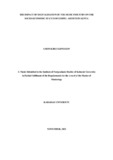THE IMPACT OF DIGITALISATION OF THE MUSIC INDUSTRY ON THE SOCIO-ECONOMIC STATUS OF GOSPEL ARTISTS IN KENYA
Abstract
The Fourth Industrial Revolution (4IR) has significantly impacted the music industry,
bringing opportunities and challenges. The digitalisation by 4IR has played a pivotal
role in reshaping the music soundscape from its creation, production, distribution, and
consumption. It acted as a lifeline for the industry, rescuing it from the decline it faced at
the turn of the millennium. The shift from physical records to digital platforms, offering
on-demand streaming and downloading services, has revolutionised music creation,
production, marketing, and consumption. This study aimed to delve into the contrasting
perspectives within the Kenyan gospel artist community regarding the impact of
digitalisation on their socio-economic status (SES). Drawing on the Unified Theory of
Acceptance and Use of Technology by Venkatesh et al. (2003), the research explored the
consequences of the digitalisation of the music industry on Kenyan Gospel Artists
(KGAs).A qualitative phenomenological research design was employed to uncover the
lived experiences of KGAs and their SES in relation to their engagement in the digital
music era. Purposive and Snowball sampling methods were used to gather insights from
artists who shared common characteristics. In-depth interviews were conducted for data
collection. The findings highlighted that while artists are benefiting from digital
platforms, they are also vulnerable to new forms of exploitation. Platform capitalism and
the absence of government intervention emerged as significant threats to the industry's
growth. The consensus among most respondents was that addressing these challenges is
vital to ensure the music industry's future remains secure. The study proposes further
research avenues, emphasising the impact of digital disruptions on the music industry,
the implications of platform capitalism, and the need for robust copyright and royalty
laws. In addressing these issues, the music industry can better navigate the complexities
of the digital age and safeguard the interests of its artists.

